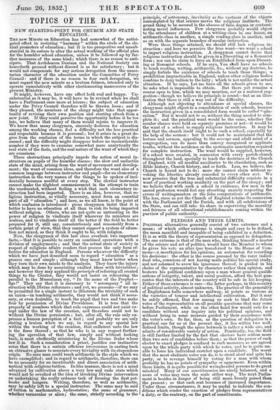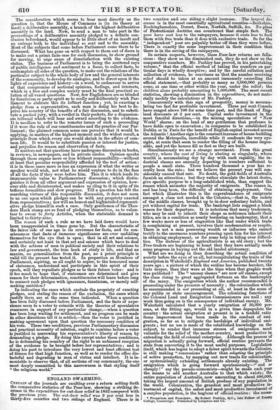PLEDGES AND THEIR LIMITS.
Porrnur. alternatives generally consist of two extremes and a mean; of which either extreme is simple and easy to be defined, i
the mean manifold and incapable of being exhibited in a definition. It is so with the theory of representation as opposed to delegation. The one extreme is that of the man who, thinking himself a master of the science and art of politics, would have the Member to whom he gives his vote an alter ipse transferred to the House of Com- mons—a mouthpiece for his opinions, an automaton for recording his decisions : the other is the course pursued by the rarer indivi- dual who* conscious of not having made politics his special study, and not ashamed to avow his ignorance thereof, is guided in his choice of the representative by character rather than opinion, and bestows his political confidence upon a man whose general qualifi- cations of integrity, talent, and social position, afford the best gua- rantee that the interests of the country will be safe in his keeping. Either of these extremes is rare—the latter perhaps, in this country of political activity, almost unknown. The practice of the generality of Englishmen halts somewhere midway, at points as various as the varieties of temper and intellectual cultivation. But it may be safely affirmed, that few among us seek to bind the future votes of the representative on all possible questions that may come before Parliament, while on the other hand few would vote for a candidate without any inquiry into his political opinions, and without being in some measure guided by their accordance with the voter's own. '-So far, then, as the question of delegation is a practical one for us at the present day, it lies within two well- defined limits, though the space between is rather a wide one, and admits of considerable variety of action. Practically, too, the field is still farther limited by the fact that electors have seldom more than two sets of candidates before them ; so that the power of each elector to exact pledges is confined to such measures as are agreed upon by the whole party with which he votes; and he is quite un- able to force his individual crotchet upon a candidate. The worst that the most obstinate voter can do, is to stand aloof and spite his party, or to revenge himself by voting for a man with whom probably he has no points of sympathy or agreement. Even within these limits, it is quite possible for wrongheaded persons to do great mischief. Many of our constituencies are nicely balanced, and a score of votes may turn the scale either way. The next Parlia- ment is besides in danger of being still morn tvenly poised than the present ; so that each seat becomes of increased. importance. Under these circumstances, it may be useful to indicate the con- ditions which render the exaction of pledges from representatives a duty, or the contrary, on the part of constituents.
The consideration which seems to bear most directly on the question is, that the House of Commons is (in its theory at least) a deliberative assembly, a branch of the highest deliberative assembly in the land. Now, to send a man to take part in the proceedings of a deliberative assembly pledged to a definite con- clusion beforehand, would appear to be little short of an insult and an outrage both to the individual so sent and to the assembly. Most of the subjects that come before Parliament come there to be discussed. What has gone on with respect to them out of doors is to make out a prima facie case for such discussion, to show ground for moving, to urge cause of dissatisfaction with the existing status. The business of Parliament is to bring the scattered rays of public intelligence and sentiment to a focus, to collect facts, to contemplate all sides of the question, to make out the relations of the particular subject to the whole body of law and the general interests of the community, to develop its analogies, and to direct upon it the lights of experience and history—in a word, to endeavour to arrive at that compromise of sectional opinions, feelings, and interests, which in a free and complex society must be the final practical so- lution of all vexed questions. Now, few Englishmen are so blinded by fanaticism or party-spirit as to coolly and deliberately wish Par- liament to abdicate this its loftiest function ; yet, in exacting a pledge from a representative, each man is doing his best to de- prive his country of the benefits of a fair discussion, and to substi- tute a packed jury, with a verdict in their pockets, for a dispassion- ate tribunal which will hear and award according to the evidence. It is needless to refer to the remoter issues of such a proceeding if it were the rule of our constituencies and the practice of our Par- liament; the plainest common sense can perceive that it would. be applying, in matters of the highest moment and the widest result, a principle from which every one would shrink in the affairs of com- mon life. It would be to substitute passion or interest for justice, and prejudice for reason and observation of facts. It matters not that questions have undergone discussion in books, in reviews, in newspapers, and in private circles. Opinion speaks through these organs more or less without responsibility—without at least that peculiar responsibility afforded by the test of action: it is in these eases more or less an expression of what the writer or speaker would wish, not what he would venture to do in the face of all the facts if they were before him. This it is which lends its immeasurable value to Parliamentary discussion which distin- guishes it from all other argument and expression of opinion, how- ever able and disinterested, and makes us cling to it in spite of its tedious formalities and slow progress. Till a question has felt the searching virtues of this responsible cliscussion, it does not seem to us one upon which pledges can be with any propriety exacted from representatives ; nor will an honest and lug/minded represent- ative pledge himself in such a case. Only gentlemen of the Theo- dore Hook stamp are so fond of pledging themselves, as to volun- teer to swear to forty Articles, when the statutable demand is limited to thirty-nine.
The reason of such a rule as we have laid down would have been unappreciated in times gone by. But the characteristic of the fairer side of our age is its reverence for facts, and its con- sciousness that facts of immense significance are ever unfolding themselves for the eye that is open ; that in all art and science, and certainly not least in that art and science which have to deal with the actions of men in political society and their relations to law and government, the true book of study is life, and that no maxim, no generalization from the past, no a priori principle is valid till the present has bested it. In proportion as Members of Parliament, aspiring, as all ought to aspire, to the honoured name of statesmen, understand and participate in this spirit of their epoch, will they repudiate pledges as to their future votes : and is it too much to hope that, if statesmen are determined and give reason for their determination, constituencies will learn before long to connect such pledges with ignorance, fanaticism, or merely self- seeking ambition P
In indicating the eases which exclude the propriety of exacting pledges, and stating the reason of the exclusion, the cases which justify them are at the same time indicated. When a question has been fully discussed before Parliament, and the facts of expe- rience seem to a voter to coincide with the theories of speculative reasoners in support of any particular change,—when a question has been long waiting for settlement, and no progress can be made in other directions till it is settled,—then the voter is justified in making agreement upon that question the necessary condition of his vote. These two conditions, previous Parliamentary discussion and practical necessity of solution, ought to combine before a voter is justified in narrowing his representative's liberty of reason by demanding a pledge. By doing this except under these conditions, he is defrauding his country of the right to an unbiassed reception of the evidence to be brought before her representatives ; and is doing his part to introduce the very lowest and least efficient test of fitness for that high function, as well as to render the office dis- tasteful and degrading to men of virtue and intellect. It is la- mentable to observe that, of all sections of our community, the one most deeply committed to this narrowness is that styling itself " the religious world."



























 Previous page
Previous page